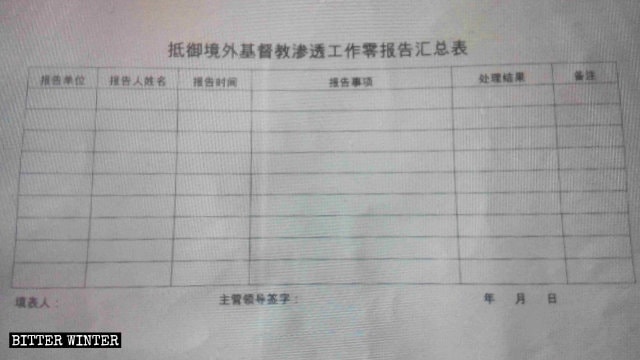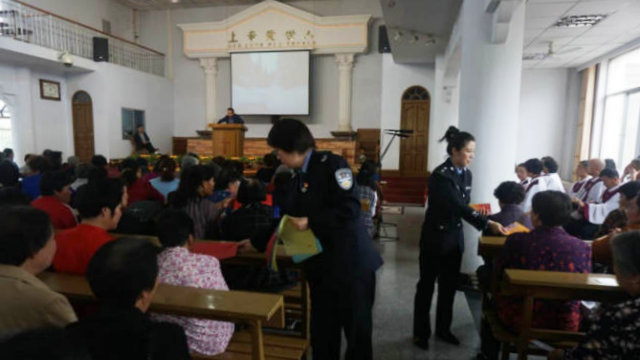The CCP is stepping up efforts to inspect churches with foreign ties nationwide, registering and surveilling believers to later implement coordinated crackdowns.

In July, the government of a town under the jurisdiction of Huadian city in the northeastern province of Jilin sent out orders to administrations of each village under its authority to investigate and ascertain if there are any South Koreans in local Christian groups.
“This investigation targets Christians, aimed at ensuring that foreign missionaries do not influence religious groups,” an official from one of the villages revealed to Bitter Winter. “We have to report the results of our investigation to the police station every day.”
Village officials have received special forms to fill them in with information about the detected cases of “foreign Christian infiltration” and how they have been handled.

Similar fact-finding investigations and crackdown operations have been launched nationwide, as prescribed by the Work Plan of the Special Operation to Investigate and Deal with Overseas Christian Infiltration According to Law, jointly adopted by the United Front Work Department and the Ministry of Public Security earlier this year.
According to the document, religious groups with foreign affiliations should be investigated according to specific parameters: their background, organizational settings, and members; branches and activity venues in China; contacts, as well as the scale and scope of activities in China; information about affected domestic Christian churches, meeting venues, and believers; online evangelism; information about funds; “illegal” operations; and information about whether any of the closed down South Korean churches have resumed activities in China.
The government has even established a “working database for resistance against foreign Christian infiltration” to register and monitor the situation in foreign-related religious groups.
In June, the leading group of “United Front work” in a county of the eastern province of Shandong issued a document that requires to collect intelligence on religious movements with foreign ties and adopt “timely approaches to deal with them.”
At the beginning of July, several Jixi city communities in the northeastern province of Heilongjiang were required by the local Religious Affairs Office to secretly investigate the congregations of South Korean churches in the locality. According to a local official, the targets for investigations have been determined based on a list provided by the upper-level government.
In June, more than 40 house church believers from Hejin city in the northern province of Shanxi were arrested and interrogated because their church has been suspected of having ties with South Korea.
On the morning of August 28, over 80 believers of a South Korea-based Good News Mission church in the northern province of Hebei were having a gathering when six police officers raided the church. The police claimed that because of their ties with South Korea, all future meetings should be ceased since they are considered “illegal gatherings.”
Believers’ identity information was registered, and their photos were taken. The person in charge of the church was questioned about the whereabouts of the church’s money. As a result, four local pastors were detained for five days because they “engaged in the infiltration of foreign organizations.”
“Many people in the world believe in Jesus Christ, but the Chinese leaders won’t recognize Him. They always proclaim that people should believe in the ‘sinicized’ Christianity, but in fact, Xi Jinping himself just wants to be God,” an elderly believer said with anger.
On June 15, officials from Jixi city’s Didao district raided a house church in the area, claiming that it is related to South Korea because the church preacher had studied there, and arrested the preacher and six congregants.
The government of a county in Xiangyang, a prefecture-level city in the central province of Hubei, issued an order in September, requiring to intensify efforts in preventing “foreign religious infiltration,” especially resisting the influence of South Korean Christian groups in rural areas and schools.
Source: Bitter Winter












